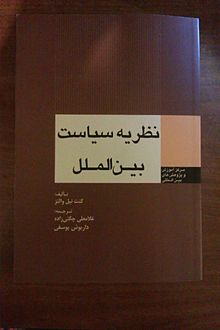| Author | Kenneth Waltz |
|---|---|
| Subject | International relations |
| Published | 1979 (McGraw-Hill) |
| Pages | 251 |
Theory of International Politics is a 1979 book on international relations theory by Kenneth Waltz that offers a new theory, the neorealist theory of international relations. Taking into account the influence of neoclassical economic theory, Waltz argued that the fundamental "ordering principle" (p. 88) of the international political system is anarchy, which is defined by the presence of "functionally undifferentiated" (p. 97) individual state actors lacking "relations of super- and subordination" (p. 88) that are distinguished only by their varying capabilities.
Waltz argues that broad patterns of state behavior can be understood as a consequence of states pursuing incentives provided by the anarchic structure of the international system. He argues that state pursue their security above other goals, which limits the potential for cooperation and creates security competition. One of the major findings of the book is that states tend to balance against power, which leads to the persistent formation of balances of power.[1][2] Waltz also argues that bipolarity (the presence of two great powers) is more stable than multipolarity (the presence of three or more great powers).
It is arguably the most influential book in international relations, causing a fundamental discursive transformation and bringing the concept of anarchy to the forefront.[3] It is the most assigned book in International Relations graduate training at U.S. universities.[4] John Mearsheimer describes it as among the three most influential realist works of international relations of the 20th century.[5] According to Charles Glaser, the book is the "defining work" in the neorealist international relations literature.[6]
See also
- Social Theory of International Politics
References
- ^ Wohlforth, William C.; Little, Richard; Kaufman, Stuart J.; Kang, David; Jones, Charles A.; Hui, Victoria Tin-Bor; Eckstein, Arthur; Deudney, Daniel; Brenner, William L. (2016-07-24). "Testing Balance-of-Power Theory in World History:". European Journal of International Relations. doi:10.1177/1354066107076951.
- ^ Little, Richard, ed. (2007), "Kenneth N. Waltz's Theory of International Politics", The Balance of Power in International Relations: Metaphors, Myths and Models, Cambridge: Cambridge University Press, pp. 167–212, doi:10.1017/cbo9780511816635.006, ISBN 978-0-521-87488-5, retrieved 2021-01-19
- ^ Donnelly, Jack (2015-11-01). "The discourse of anarchy in IR". International Theory. 7 (3): 393–425. doi:10.1017/S1752971915000111. ISSN 1752-9727.
- ^ Colgan, Jeff D. (2016-09-01). "Where Is International Relations Going? Evidence from Graduate Training". International Studies Quarterly. 60 (3): 486–498. doi:10.1093/isq/sqv017. ISSN 0020-8833.
- ^ Mearsheimer, John (2001). The Tragedy of Great Power Politics. W.W. Norton. p. 14.
- ^ Glaser, Charles L. (2010). "Rational Theory of International Politics". Princeton University Press. p. 149.
